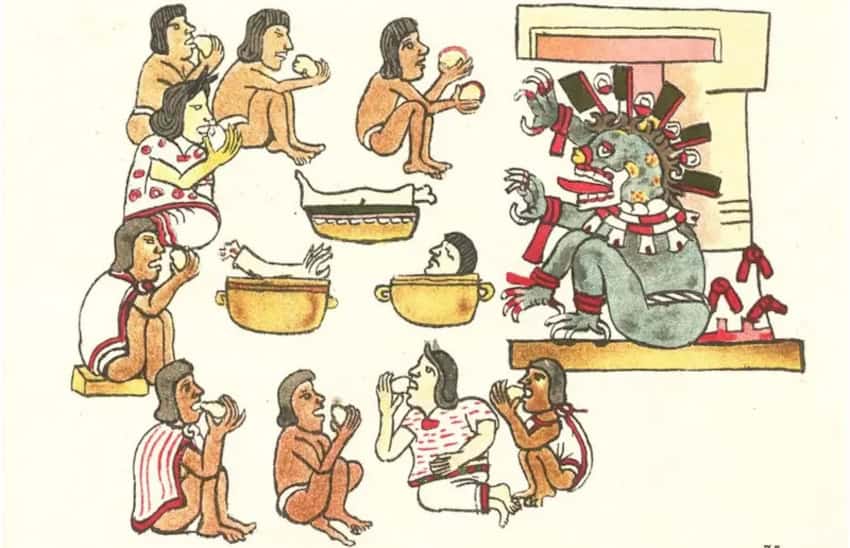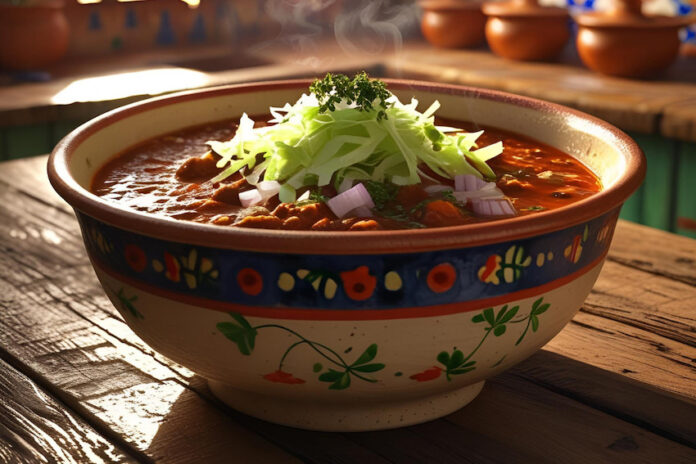Summer has fully arrived in Mexico City, and that brings a wonderful transformation. Everything turns vibrant green, the air is filled with the fresh scent of rain, and the weather becomes delightful. It’s one of the most beautiful seasons for morning walks, as long as you return before the afternoon showers. These rains help cool down the high temperatures and signal the ideal time to enjoy a bowl of pozole.
Pre-Hispanic Tlacatlaolli

In Mexico, pozole is traditionally eaten during celebrations, such as Independence Day dinner. This practice is believed to be linked to the dish’s predecessor, Tlacatlaolli. The word “Tlacatlaolli” comes from Nahuatl and translates to “maize of man.” It was a ceremonial stew that was consumed only by warriors, important priests, and tlatoanis (rulers). This dish held sacred significance and was made from human meat that was cooked with maize.
Yes, I know — it sounds awful and nauseating. However, within its original context, it becomes more understandable. Unlike our largely secular lives today, Mesoamerican societies were deeply spiritual, and their daily lives were closely linked to their religious practices. This connection is easily understood when you realize how dependent they were on nature. Due to its importance for survival, different aspects of nature were deified, leading them to have gods and goddesses for everything: the sun, the moon, the wind, water, earth, war, rebirth, death, beauty, and fertility, to name a few. Their gods resembled humans in that they were not perfect or eternal.
They believed that human actions were essential for keeping the gods alive. In this context, human sacrifices were seen as a way to “feed” the gods. If the gods were to die, the people would also face dire consequences. Although it may seem contradictory from our perspective, sacrifices were deemed necessary for humans to keep the gods happy and maintain order in the world.
During certain ceremonies — although there is no academic consensus on which ones — priests, as intermediaries between gods and humans, elite warriors, and specific tlatoanis could eat a bowl of Tlacatlaolli to establish a connection with their gods.
From Tlacatlaolli to Pozole
Can you imagine the horror the first Spaniards felt upon witnessing someone being cooked in a pot? They would have been just as horrified as we would be today. These scenes were used as evidence to portray the Aztecs as savages, far removed from God’s grace, which justified the banning of anything indigenous as sinful and the urgence of the Spanish Conquest. However, the friars recognized potential in the dish—substituting warrior flesh for pork.
And so, pozole was born. The word “pozolli” in Nahuatl means “foamy,” which refers to the way maize foams when boiled with lime. This transformation also meant that the dish was no longer exclusive to priests, warriors, or rulers; it became a dish for everyone.
The Patriotic Dish?
Pozole is a traditional dish that is essential during Mexico’s national holidays, but its popularity isn’t solely due to its cultural significance or any direct connection to Independence Day. A more practical reason is that cacahuazintle maize, or hominy, is harvested in September, making it more accessible and affordable to obtain and buy.
Thanks to modern conveniences, you can enjoy pozole any time of the year, which we are thankful for. Here’s a simple recipe that does take some time to prepare, but it’s worth every minute.
Traditional White Pozole Recipe (4 servings)
Vegan tip: If you follow a vegan diet, substitute meat with sautéed shiitake or oyster mushrooms. Sautéing them beforehand ensures they don’t release too much liquid into the broth.
Main Ingredients:
Toppings:
Preparation:
Friends, despite its dark origins, pozole is a delicious dish that you absolutely shouldn’t miss. It’s perfect for days when you need a little extra comfort. Honestly, it’s so good that
I’ve even started adapting jazz classics to sing its praises.
Isn’t It a Lovely (Pozole) Day?
By Irving Berlin (unauthorized version)
The weather is frightening,
The thunder and lightning
Seem to be having their way—
But as far as I’m concerned, it’s a pozole day.
The turn in the weather will keep us together,
So I can honestly say,
That as far as I’m concerned, it’s a pozole day—
And everything is okay.
Do you love pozole as much as we Mexicans do?
María Meléndez is a Mexico City food blogger and influencer.
